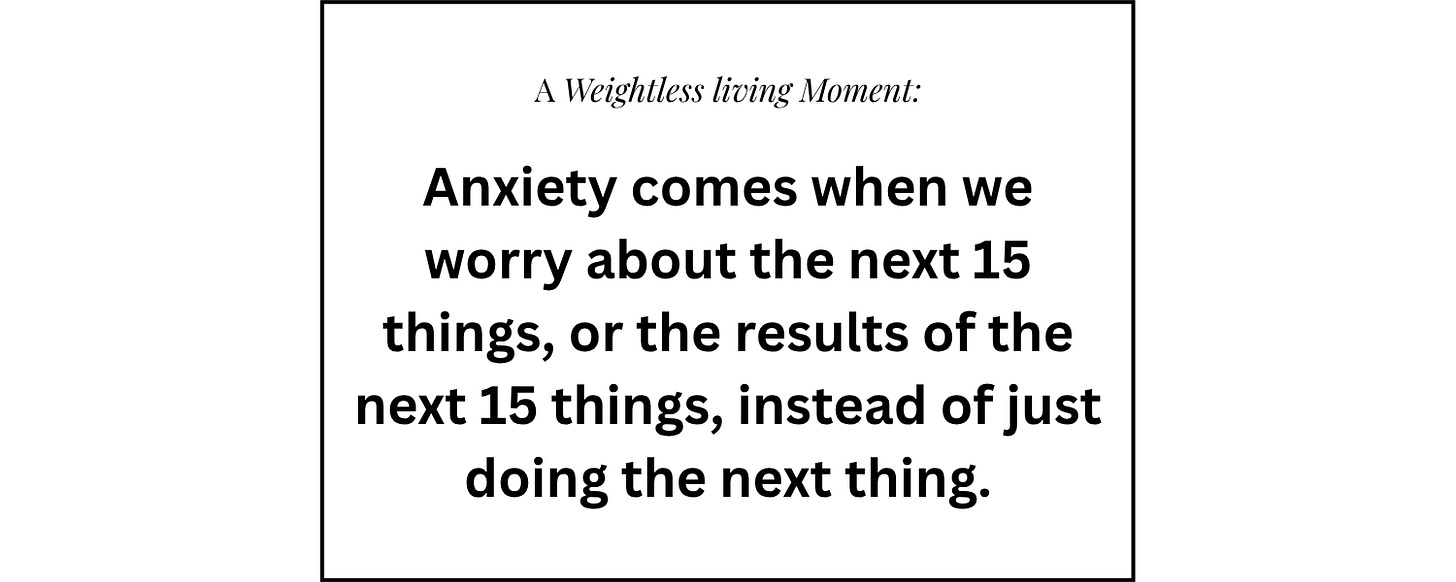Mental Tourism
a trend I accidentally made a lifestyle (Part 2)
(If you missed Part 1, The Future Needs Me, I highly recommend letting your mind wander back there first. But if you’re already in the future with me—read on.)
So, it’s news to me, but turns out I’ve been single-handedly supporting the mental tourism industry for years. My full-time job in the future includes frequent travel to the past, leaving those I love in the present significantly neglected.
Mental tourism: emotional travel your body can’t afford. It’s the exhausting habit of visiting places you can’t live—regretting what already happened, rehearsing what hasn’t. It’s travel without enjoyment, and work without peace.
But I can tell you today, with full confidence and fatigue, that I’m tired of traveling. I want to rest. I want to be grounded like a flight attendant who gave away too many free lunches. My anxious soul has been craving groundedness. That quiet steadiness that settles my racing mind and whispers, “You’re safe here. You don’t need to travel out of time.” I want the freedom of not having to hold everything together in space and time. Like I don’t want to have to keep running back to yesterday or sprinting ahead to tomorrow to find peace.

The groundedness I’m craving feels like staying home in my safe house with sturdy brick walls and a new roof while a major storm rages outside. I can hear the wind and the hail, but it doesn’t worry me. The thunder crashes, but I’m not in danger of being struck down. I dream of living each day with the unforced ease of knowing that, whatever comes, my roof is not gonna give way. And of being able to trade fear for security as easily as I return my Amazon packages to Whole Foods—for a full refund.
And honestly? I don’t think this kind of groundedness is some advanced spiritual level for the few who’ve figured it out. I think it’s just... life. The kind of life we were meant to live. And I’m starting to believe it’s actually available—right here, right now.
So, how do we stop all the time travel and actually stay grounded?
It starts with the gazing. And I don’t mean a passing glance. I mean gazing. Like David talks about in Psalm 27:4
“One thing have I asked of the Lord… that I may dwell in the house of the Lord all the days of my life, to gaze upon the beauty of the Lord…”
Gazing feels like the opposite of anxiety, doesn’t it? Anxiety is a frantic scan for what might go wrong. While gazing is a steady look at what‘s already good. It doesn’t solve everything, but it reorients my soul and reminds me that God is still here, and still good, which is the opposite of what anxiety is really trying to convince me of.
The Art of Not Squirreling Around
But how to gaze? That’s the question. How do you gaze at Him, and continue gazing without losing interest, or being distracted by something more pressing? Because I’m like a squirrel dog learning to sit for my master while squirrels (my job) are just doing somersaults all around me, and I gotta get to work. I mean, I want to stay. I want to listen. But there’s too much squirreling to be done.
In his Psalm, David goes on to say, “I believe that I shall look upon the goodness of the Lord in the land of the living.”
To gaze is to look for His goodness in the land of the living, not in the land of the ‘someday I’ll be living there,’ or ‘I used to live there,’ but in the only place I can actually gaze from—the land where I am living. That makes this not just an abstract idea of who God is, but a living presence, in my present.
Gazing on His goodness is grounding for the mental tourist, because it gives you a reason to stay. It anchors you in the present, not out of obligation, but out of desire. When your eyes are fixed on His goodness, your soul can finally settle down and stop sprinting into the future or spiraling back into the past.
Here, in the now, you remember: you don’t have to strive to be safe.
His goodness and mercy are already following you—every day of your life (see Psalm 23:6).
Some might argue, “But God lives outside of time. His goodness is in the future too.” And yes, that’s true—His goodness fills all of time because He is eternal.
But we’re not eternal. We’re human. We don’t float through time like Doctor Who in his TARDIS. We are bound to walk through time, one embodied moment at a time.
Our minds might time-travel, running ahead to tomorrow or looping back to yesterday, but our bodies don’t go with them. They stay put, footing the bill. They pay in a tight chest, nausea, raging headache, racing heart, dizziness, fatigue, and more, just waiting for our thoughts to come home. It’s like our bodies become characters in a Left Behind novel, stranded and stressed while our minds rapture off into imagined apocalypses.
That’s why God’s goodness is for now. Because our bodies are here, now. Our breath is here, now. And His goodness meets us now, where we actually are. The same goodness that will carry us into the actual future is already holding us in this actual moment. We can’t live in the future. We can only gaze at His goodness in the present—where He’s placed us, and where His mercies are new every morning… not just some morning down the road.
I think that’s what it means to gaze, to remember His goodness right here, right now. To look steadily and intently, especially in adoration. To fix your heart, mind, and soul on His goodness, and let it hold you here, now, grounded in a love that never fails.
But the real trick is how to keep that going, not just for your 10-minute devotional or your bedtime prayer, but for all time.
How do you keep grounded in His love?
I think gazing is the act of letting His love be the defining reality of your day instead of your fears or failures. So when a fear pops into your head, you remind yourself—right then—that God’s goodness is greater than any imagined future.
And it’s not a one-and-done kind of thing. It’s a returning to the ground under your feet. And you’ve got to re-ground over and over again, returning from your imagined world… back to what’s actually real.
It sounds obvious, maybe even cliché, but think about it – how often do you actually ingest or ponder His love, not just believe it in theory, but chew on it and let it feed you? Gazing isn’t just glancing at or raising your hand for truths you intellectually agree with. It’s about absorbing them until they define your present reality. Believing in His love means trusting that everything that comes to you today is evidence of His love for you. It’s not just believing He loved you at the cross or will love you when you finally get it all together, but that He loves, present tense, you right now. And now. And now.
1 John 4:16 says, “So we have come to know and to believe the love that God has for us.” There’s knowing, and then there’s believing—leaning your whole weight on it. To receive His love daily is to sit in it long enough for it to quiet your anxiety and fear. It’s waking up and saying, “Before I do anything, before I fix anything, before I perform anything… I am loved by You. Right now. As I am. Thank you!”
When you receive His love like that, your gaze gets fixed. Because love is the most grounding force in the universe. It tells your soul: You’re safe. You belong. You’re held. You’re home.
And then you thank Him.
Gratitude is full-on gazing at His goodness. But for it to ground you, it needs to be gratitude for the present.
Gratitude for the past can encourage you.
Gratitude for the future can give you hope,
but only gratitude for right now anchors you here.
I’m a thankful person, but I’ve realized that thanking God for what He’s done before—while it is powerful—if my gratitude never refers to the present moment, it’s just more mental tourism, as I keep looking backward to find Him instead of seeing that He is here now.
So, grounding gratitude is as simple as saying, “Thank You for this breath. Thank You for this moment. Thank You that You are with me right now, in this ordinary space.” It shifts your eyes from what you lack to who He is and what He’s giving you right now, in the only place you actually live.
Gazing is also looking steadily at His sovereignty.
That just means looking at His power and rule instead of your powerlessness. It’s remembering that He holds the past you can’t change and the future you can’t control. Trust is the gaze that says, “You are God. I am not. And that is good news.”





